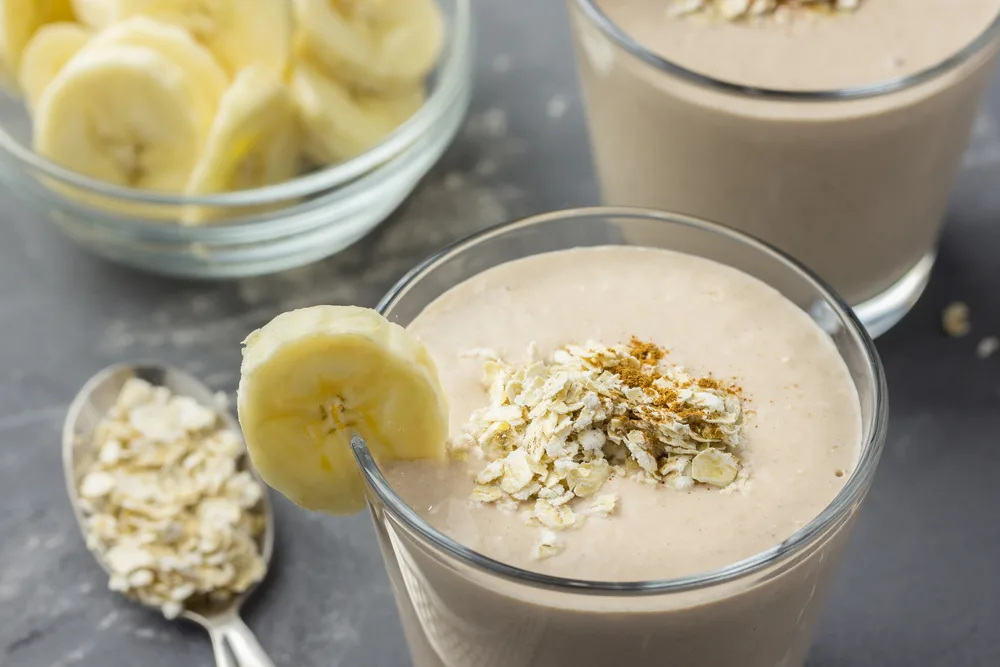Eating oatmeal at night can be a healthy and satisfying meal or snack. It is a good source of fiber, which can help you feel full and keep your blood sugar levels stable. Oatmeal also contains melatonin, a hormone that helps regulate sleep. Learn how to make oatmeal at night, its health benefits, and different recipes.
Nutrition Facts
Oatmeal is a nutritious food that is packed with vitamins, minerals, and fiber. It is a good source of complex carbohydrates and protein, and it is low in fat. Oatmeal is also a good source of beta-glucans, a type of soluble fiber that has been shown to have a number of health benefits, including lowering cholesterol levels and improving blood sugar control.
Here is a table of the nutrition facts for 1 cup (81 grams) of cooked oatmeal:
| Nutrient | Amount | Daily Value (%DV) |
|---|---|---|
| Calories | 151.5 | 7 |
| Fat | 2.5 grams | 4% |
| Carbohydrates | 25 grams | 8% |
| Fiber | 4 grams | 16% |
| Sugar | 1 gram | 1% |
| Protein | 6.5 grams | 13% |
| Manganese | 63.91% | |
| Phosphorus | 13.3% | |
| Magnesium | 13.3% | |
| Copper | 17.6% | |
| Iron | 9.4% | |
| Zinc | 13.4% | |
| Folate | 3.24% | |
| Vitamin B1 (thiamin) | 15.5% | |
| Vitamin B5 (pantothenic acid) | 9.07% |
Oatmeal is also a good source of smaller amounts of calcium, potassium, vitamin B6 (pyridoxine), and vitamin B3 (niacin).

Health Benefits
Oatmeal has been shown to have a number of health benefits, including:
- Lowering cholesterol levels: The beta-glucans in oatmeal can help to lower LDL (bad) cholesterol levels.
- Improving blood sugar control: Oatmeal is a good source of complex carbohydrates and fiber, which can help to regulate blood sugar levels.
- Promoting weight loss: Oatmeal is a filling and low-calorie food that can help you to lose weight or maintain a healthy weight.
- Reducing the risk of heart disease: Oatmeal can help to reduce the risk of heart disease by lowering cholesterol levels and improving blood sugar control.
- Improving gut health: The fiber in oatmeal can help to improve gut health by feeding the good bacteria in the gut.
Is Oatmeal Good for Weight Loss?
Oatmeal is a nutritious whole grain that has been shown to be helpful for weight loss. It is low in calories and high in fiber and protein, which are all important nutrients for weight loss. Oatmeal is also a good source of beta-glucans, a type of soluble fiber that has been shown to have a number of health benefits, including weight loss.
One study, published in the journal Obesity, found that people who ate oatmeal for breakfast lost more weight and body fat than those who ate a different breakfast cereal. The study also found that the people who ate oatmeal had better blood sugar control.
Another study, published in the journal Nutrition, Metabolism & Cardiovascular Diseases, found that people who ate oatmeal for breakfast had lower levels of the hunger hormone ghrelin and higher levels of the fullness hormone peptide YY than those who ate a different breakfast cereal. This suggests that oatmeal can help to reduce appetite and promote feelings of fullness.
Overall, the research suggests that oatmeal can be a helpful part of a weight loss diet. It is a low-calorie food that is high in fiber and protein, and it is a good source of beta-glucans.
Incorporating Oatmeal into Your Diet
Here are some tips for incorporating oatmeal into your diet for weight loss:
- Choose whole-grain oats over instant oats. Whole grain oats are more nutritious and take longer to digest, which can help you feel full longer.
- Cook oatmeal with water or milk. You can also add a pinch of salt or cinnamon to the water for extra flavor.
- Add healthy toppings to your oatmeal, such as nuts, seeds, berries, or yogurt. This will help to increase the nutrient content and flavor of your oatmeal.
- Avoid adding too much sugar to your oatmeal. Sugar can add unwanted calories and empty nutrients.
- Take the easy route and try Oats Overnight.
When is the Best Time to Eat Oatmeal?
Oatmeal is a great breakfast food, but you might not know when is the best time to eat it. Is it better for you in the morning or at night?
The answer depends on how much fiber you need and how long you are willing to wait for your food. Oatmeal has a lot of fiber and can fill you up quickly if you eat it during the day. It will also help keep your blood sugar stable, which is important if you have diabetes.
If you are trying to lose weight, then eating oatmeal at night may be better because it will help keep you full longer than other foods so that you don’t get hungry while sleeping and wake up with cravings.

Benefits of Eating Oatmeal in the Morning
There are many benefits to eating oatmeal in the morning. Oatmeal is a nutritious food that is packed with vitamins, minerals, and fiber. It is also a good source of complex carbohydrates and protein, which can help you feel full and energized throughout the morning.
Here are some of the specific benefits of eating oatmeal in the morning:
- Improves blood sugar control: Oatmeal is a good source of complex carbohydrates and fiber, which can help to regulate blood sugar levels. This is especially important for people with diabetes or prediabetes.
- Reduces cholesterol levels: The beta-glucans in oatmeal can help to lower LDL (bad) cholesterol levels.
- Promotes weight loss: Oatmeal is a filling and low-calorie food that can help you to lose weight or maintain a healthy weight.
- Reduces the risk of heart disease: Oatmeal can help to reduce the risk of heart disease by lowering cholesterol levels and improving blood sugar control.
- Improves gut health: The fiber in oatmeal can help to improve gut health by feeding the good bacteria in the gut.
- Provides sustained energy: Oatmeal is a good source of complex carbohydrates, which are broken down slowly by the body. This provides sustained energy throughout the morning.
- Improves mood and focus: Oatmeal contains tryptophan, an amino acid that is converted into serotonin in the brain. Serotonin is a neurotransmitter that plays a role in mood and focus.
In addition to these health benefits, oatmeal is also a versatile and affordable food. It can be prepared in a variety of ways, and it can be topped with a variety of healthy ingredients, such as fruits, nuts, and seeds.
Benefits of Eating Oatmeal at Night
Oatmeal is a nutritious and versatile food that can be enjoyed at any time of day. However, there are some potential benefits to eating oatmeal at night.
One of the main benefits of eating oatmeal at night is that it can help to promote better sleep. Oatmeal contains tryptophan, an amino acid that is converted into serotonin in the brain. Serotonin is a neurotransmitter that plays a role in mood and sleep. Additionally, oatmeal contains melatonin, a hormone that helps to regulate sleep-wake cycles.
Another benefit of eating oatmeal at night is that it can help to improve digestion. Oatmeal is a good source of fiber, which can help to keep the digestive system moving and prevent constipation. Additionally, oatmeal can help to soothe an upset stomach.
Oatmeal can also help to reduce appetite and promote feelings of fullness. This can be helpful if you are trying to lose weight or maintain a healthy weight. Additionally, oatmeal is a good source of complex carbohydrates, which are broken down slowly by the body. This provides sustained energy throughout the night, which can help you to sleep better.
Finally, oatmeal contains magnesium, a mineral that has been shown to reduce stress levels and promote relaxation. This can be helpful if you have trouble sleeping due to stress.
Overall, there are a number of potential benefits to eating oatmeal at night. It is a nutritious and versatile food that can help to promote better sleep, improve digestion, reduce appetite, and reduce stress levels.
Tips and Tricks
If you are considering eating oatmeal at night, here are a few tips:
- Choose whole-grain oats over instant oats. Whole grain oats are more nutritious and take longer to digest, which can help you to feel full longer.
- Cook oatmeal with water or milk. You can also add a pinch of salt or cinnamon to the water for extra flavor.
- Add healthy toppings to your oatmeal, such as nuts, seeds, berries, or yogurt. This will help to increase the nutrient content and flavor of your oatmeal.
- Avoid adding too much sugar to your oatmeal. Sugar can add unwanted calories and empty nutrients.
- Eat oatmeal at night at least 30 minutes before bed. This will give your body time to digest the oatmeal and absorb the nutrients.
Tips on Eating Oatmeal for Better Sleep
Oatmeal is a nutritious and versatile food that can be enjoyed at any time of day, but it may be especially beneficial to eat it before bed. Oatmeal contains a number of nutrients and compounds that have been shown to promote better sleep, including:
- Tryptophan: An amino acid that is converted into serotonin in the brain. Serotonin is a neurotransmitter that plays a role in mood and sleep.
- Melatonin: A hormone that helps to regulate sleep-wake cycles.
- Fiber: Helps to keep the digestive system moving and prevent constipation, which can lead to better sleep.
- Magnesium: A mineral that has been shown to reduce stress levels and promote relaxation.
Here are some tips for eating oatmeal for better sleep:
- Choose whole grain oats over instant oats. Whole grain oats are more nutritious and take longer to digest, which can help you to feel full longer and promote better sleep.
- Cook oatmeal with water or milk. You can also add a pinch of salt or cinnamon to the water for extra flavor.
- Add healthy toppings to your oatmeal, such as nuts, seeds, berries, or yogurt. This will help to increase the nutrient content and flavor of your oatmeal, and it may also help to promote better sleep. For example, nuts and seeds are a good source of melatonin, and berries are a good source of antioxidants.
- Avoid adding too much sugar to your oatmeal. Sugar can interfere with sleep by raising blood sugar levels and then causing them to crash.
- Eat oatmeal at least 30 minutes before bed. This will give your body time to digest the oatmeal and absorb the nutrients.
- Top with dark chocolate. Dark chocolate is known to be good for sleep.

What Kind of Oatmeal for Dinner?
Eating oatmeal for dinner can be both nutritious and comforting. However, the type of oatmeal and how you prepare it can vary depending on your preferences and dietary needs. Here are a few types of oatmeal you might consider for an evening meal:
- Steel-cut Oats: These are whole oat groats that have been cut into chunks. They have a nutty flavor and chewy texture. Steel-cut oats take longer to cook than rolled oats but are often considered to be more nutritious and have a lower glycemic index.
- Rolled Oats: Also known as old-fashioned oats, these are steamed and then rolled to flatten. They cook faster than steel-cut oats and have a milder flavor and softer texture.
- Quick Oats: These are pre-cooked, dried, and then rolled. They’re thinner than rolled oats and cook very quickly, but they can become quite mushy if overcooked.
- Instant Oats: These are the most processed types. They are pre-cooked, dried, rolled, and then chopped into small pieces. They cook the fastest but often lack the same nutritional punch as the less-processed varieties.
Dinner Ideas:
- Savory Oatmeal: Add sautéed vegetables, a sprinkle of cheese, and a soft-boiled egg on top. Check out this Savory Oatmeal recipe that I love.
- Oatmeal with Protein: Mix in chia seeds, hemp seeds, or even a scoop of protein powder.
- Oat Risotto: A spin on traditional risotto using steel-cut oats, broth, veggies, and Parmesan.
- Sweet Oatmeal: For those with a sweet tooth, mix in fruits, nuts, and a drizzle of honey or maple syrup. Though it’s more common for breakfast, some enjoy it for dinner too.
Frequently Asked Questions (FAQs)
Yes, it can be good to eat oatmeal before bed. Oatmeal is a complex carbohydrate, which means that it is digested slowly and releases energy over time. This can help to keep your blood sugar levels stable and prevent you from waking up in the middle of the night feeling hungry.
Yes, it is okay to eat oatmeal at night for weight loss. Oatmeal is a complex carbohydrate, which means that it is digested slowly and releases energy over time. This can help to keep you feeling full and satisfied longer, which can help to reduce your overall calorie intake and promote weight loss.
The best time to eat oats at night is 30-60 minutes before bed. This will give your body time to digest the oats and absorb the nutrients before you go to sleep. Eating oats too close to bedtime may cause stomach upset or indigestion.
Yes, you can eat oats overnight. In fact, many people find that overnight oats are a convenient and healthy way to start their day.
You May Also Like
- What are Porridge Oats?
- Porridge Oats Vs Rolled Oats
- Savory Oatmeal
- Instant Pot Oatmeal
- Apple Cinnamon Oatmeal
If you enjoy this oatmeal at night post, please leave a rating and review!
